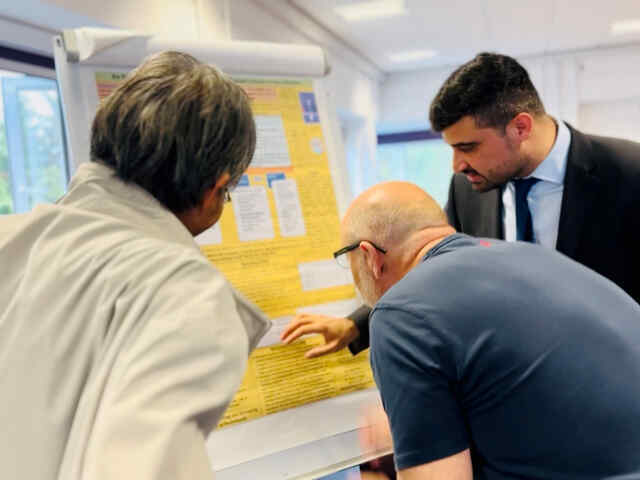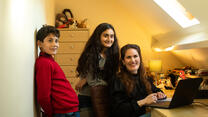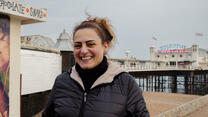Building a life in the UK can be a huge challenge for refugees. Having fled war or persecution, refugees still face significant barriers when it comes to resettlement including understanding a new language, finding employment and understanding various, often complex, systems in order to access basic services.
But when welcomed, we know that refugees have so much to offer. This is why since 2021 the International Rescue Committee’s Refugee Services in England (RISE) programme has been helping refugees integrate into their new communities.
Over the past two years, RISE has been providing vital cultural orientation training, peer mentoring, wellbeing sessions, language lessons, job skills training and more. This work has given refugees the knowledge and confidence to thrive in their new communities.
As the RISE programme concludes, we are spotlighting some incredible refugees who have rebuilt their lives in their new communities.
Bohdana’s education dreams
Bohdana, 19, left behind her home in the Kherson region of Ukraine when the war began in 2022. Along with her mother and grandparents, she settled in York in the UK and was determined to embrace a completely new culture.
Bohdana enrolled in the IRC’s Orientation for Newcomers course, which she said provided her with ‘increased cultural awareness’ and education support, adding: “This has been especially useful to me as I am applying for Universities in the UK now.”

Determined to continue her studies in the UK, Bohdana is currently looking for courses in Philosophy, Politics and Economics, with hopes of expanding her knowledge and following a career in communications.
As well as progressing with her education, Bohdana has also completed the IRC course Community Interpreting Level 2 and will soon be completing her Level 3 which means she will be able to work as an interpreter.
I am happy to use my skills and practise in our Ukrainian community. It is so important for non English speakers to be understood and if I can support that, it makes me happy and inspires me to move forward.
Opening up about her plans for the future, Bohdana said her main priority is to expand her knowledge in the UK, as she added: “I want to become a professional interpreter in a legal setting to facilitate communication and help people.”
Muhammad’s university success
30-year-old Muhammad came to the UK from Afghanistan when the Government changed in 2021. While he has since settled in Oxford, Muhammed had to make the heartbreaking decision to separate from his wife and daughter in Pakistan.
“In Afghanistan we had a good life, we were landlords over there, we had our own houses,” he said. “When I was brought over here, I felt lost in this country - I was stressed and depressed.”

Determined to make a successful life for himself and his family, Muhammad - who enrolled in the IRC’s Orientation for Newcomers programme - recently completed his master’s degree in construction management, focussing his final project on gender inequality in the construction industry.
Muhammad said: “I’m a civil engineer, I didn’t know what pathway to follow. My profession is in the construction industry, but my qualifications aren’t recognised in the UK.”
In the future, Muhammad hopes to get a job in construction and reunite with his family.
“There are many opportunities here,” he said. ”If you have the right to work, you can easily find a new job. My next step is to bring my family. Tomorrow I will have a good job, there is hope, I will get a job and support myself.”
Oksana’s career change
In April 2022, Oksana, 45, came to the UK from her home in Kharkiv, Ukraine's second largest city, situated just 30 km from the Russian border, which has experienced significant shelling in recent years. Along with her two teenage sons, the family moved in with a host from the Homes for Ukraine programme in the New Forest, before recently moving into their own house.
While Oksana previously worked as a tax officer for 20 years in her hometown, she had to completely change her career when she arrived.
I worked in the tax office for 20 years and I couldn't imagine changing my work, I was so proud of it. I didn’t think I would have to change my life like this. I thought I would be back in Ukraine in a few months when it became more safe and when I knew what would happen with my sons.
But after settling into her new home, Oksana got a job in a charity shop as a volunteer for several months before seeing a role advertised at her local council where she could give back to her community.
“I saw a Homes for Ukraine vacancy in Worcester city council for people to support Ukrainians in our area,” she said. “Me and our team, there’s three of us, we support more than 200 people.”

In her role, Oksana helps refugees apply for jobs, find houses and organises events to bring some of her culture to the UK.
Meanwhile, Oksana’s 19-year-old son is currently studying economics and politics at Sheffield University, while her 15-year-old son was accepted into a nearby school.
Opening up about taking part in the IRC’s Orientation for Newcomers and Leadership course, Oksana said they have helped her to gain confidence and meet like minded people.
I feel like it's such a nice atmosphere. Every time I go to my lessons with the IRC, I’m just full of energy. I feel like this because I love learning new things and I love the people. We have the same focus and it makes me feel happy.
Mohammad Nasir’s passion for business
Mohammad Nasir was working for the Counter Narcotics Justice Centre (CNJC) in Kabul, Afghanistan before the government changed in August 2021. Mohammad Nasir’s job meant that the family were in danger and had to find a way to leave.
After reaching out to a contact from the British Foreign Office to ask for help for his family and colleagues, he arrived in the UK on the 27th August. Now living in Eastleigh with his wife, their daughter and two sons, Mohammad Nasir has taken part in the IRC’s Orientation for Newcomers programme, Leadership programme, as well as employment training.
Opening up about his favourite part of the leadership course, Mohammad Nasir said he enjoyed creating a business model for a new company which supports refugees and asylum seekers in Hampshire.

“I loved the negotiation section of the business training,” he said, continuing: “In Afghanistan, we don't do a lot of negotiation, but I learned now that it’s effective in business.”
Mohammad Nasir - who has a degree in computer science - is currently working as an IT support officer in healthcare, but he is hoping to find a scholarship to complete his masters degree in cyber security.
He told us: “If not, I would like to start a masters degree in criminology, it was my goal at the start of 2023. I will definitely try next year, I'm trying to find a way.”
Our donors
The IRC has been providing integration support to refugees, under the RISE project, since January 2021. This work has been made possible due to EU Asylum, Migration and Integration Fund (AMIF) funding. AMIF in the UK is administered by the UK Responsible Authority (UKRA).
The funding was allocated under the EU’s 2014 to 2020 multiannual financial framework (MFF), which will conclude at the end of 2023. The IRC hopes to find alternative funding to continue to provide integration support to refugees in England.
What is the International Rescue Committee?
The International Rescue Committee responds to the world's worst humanitarian crises, including the conflict in Ukraine and the crisis in Afghanistan. We help to restore health, safety, education, economic wellbeing and power to people devastated by conflict and disaster. And we are proud to fight for a world where women and girls have an equal chance to succeed.



